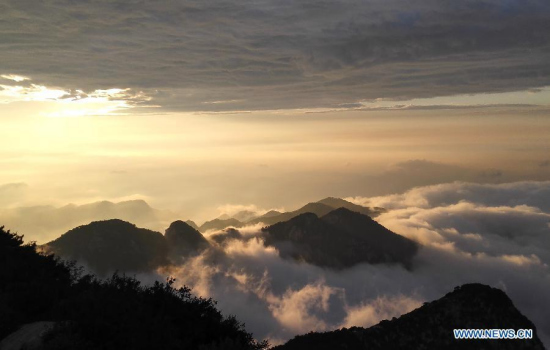
Photo taken on Aug. 6, 2015 shows the scenery of Taishan Mountain in clouds at sunset in Tai'an, east China's Shandong Province. (Photo: Xinhua/Liu Anqi)
Close your eyes and imagine Cape Town without Table Mountain. Unfathomable. The same can be said about the majestic Taishan Mountain in Tai'an in north China's Shandong province, halfway between Beijing and Shanghai.
It also happens to be a sister province of the Western Cape, a province in South Africa.
Taishan is one of five "holy" mountains in China and regarded as the most worshipped -- for more than 3,000 years it was used by Chinese emperors across dynasties to pay homage to the heavens.
Ascending the nearly 7,000 steps to summit can be a spiritual experience. For comfort and expediency, there's a cableway, which reduces the climb to only several hundred steps. The ride in the cable car proves spectacular viewing of some of the 989 species of different trees and plants. The mountain is also home to more than 200 animal species and 122 bird species, though we didn't encounter any.
There are 11 gates, 14 archways, 14 kiosks and four pavilions, scattered along the route between the base and the summit.
En route to the cable car station, along the winding road, the town's men and women carry buckets to collect fresh mountain water -- it is a local belief that drinking the fresh water daily guarantees longevity.
If the water doesn't do the trick, the trek up and down the mountain will go a long way in accomplishing that.
A UNESCO World Natural Heritage and World Cultural Heritage site, the mountain, at its peak, sits about 1,500 meters above sea level.
UNESCO describes the mountains importance thus: "Taishan Mountain is directly and tangibly associated with events whose importance in universal history cannot be minimized. These include the emergence of Confucianism, the unification of China, and the appearance of writing and literature in China."
As it is a major local tourist destination, all manner of food (great breakfast pancakes) and drink stalls await the weary climber. We visited on a Monday morning, so there were not many tourists around (although for the Chinese this means only a few thousand).
There are also a few hotels atop the mountain, which are usually booked by people wanting to see the sunrise from the Sun Viewing Peak, although our tour guide cautioned that the accommodation is of a very poor standard and the amenities rather basic.
He suggested that it would be a better bet to stay in a hotel in Tai'an and start climbing at least three to four hours ahead of day break.
Aside from the breathtaking wraparound views, the mountain is also home to the Palace of Heavenly Blessings that is inside the Temple to the God of Taishan. Other impressive structures include the Azure Cloud Temple, with its courtyards and buildings, the Divine Rock Temple with its Thousand Buddhas hall and an inscription (Most Revered of the Five Sacred Mountains) on one of the many (rock) tablets which features on the reverse side of the five-yuan bill.
At the temples, locals light incense sticks and offer a prayer.
Some tie money to good luck charms, while couples write their names on locks and attach this to an installation in the courtyard of the Goddess Bixia, symbolizing their union and for continued happiness -- the locks from one of the many vendors will set you back at about 200 RMB, so pack your own if you must.
Though the cable car saved us time and energy, if we had climbed up, the journey would arguably have been more impressive.
Every famous mountain in China has cultural relics, which some locals firmly believe can be better comprehended by experiencing it by climbing to the top.
So why are Taoism and Buddhism elements easily found in Chinese mountains?
For the Chinese, climbing mountains is more than just sightseeing. It is a process of clearing your thoughts and a journey of mental purification.
As one local put it: "As counting the steps with my feet, it gives me a clear impression of how majestic nature is and how tiny humans are. The Buddhist or Taoist temples on top take my breath away. It is the strong power of will that leads me to this height. I believe that is why the Emperors came this far to worship the gods by showing their sincerity. Scholars left their masterpieces of inscriptions with the inspiration of the beauty of nature."
"That is why I recommend you to climb up the mountain without the help of modern facilities. After spending three or four hours walking, feeling and experiencing on the way up, the money you tie and the lock you attach means much more than just it being a souvenir."
*The author Yunus Kemp is the Deputy Editor of the Cape Argus. He is on a 10-month scholarship with the China Africa Press Centre


















































